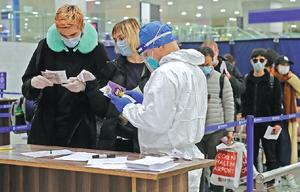 A customs officer checks passengers' health information on Wednesday at Pudong International Airport in Shanghai. (YIN LIQIN / CHINA NEWS SERVICE)
A customs officer checks passengers' health information on Wednesday at Pudong International Airport in Shanghai. (YIN LIQIN / CHINA NEWS SERVICE)
Premier Li Keqiang on Friday called for heightened measures to prevent the import or export of COVID-19 cases, saying that region-specific and multilevel health testing approaches must be adopted to ensure the safe and orderly flow of people across the border.
Li made the remark while visiting Beijing Capital International Airport, long one of the world's busiest airports. He heard reports on efforts to ensure smooth air traffic and implementation of quarantine measures to contain the contagion.
Li said COVID-19 is spreading quickly outside China, and coping with the outbreak has become a common challenge for the international community
Li said COVID-19 is spreading quickly outside China, and coping with the outbreak has become a common challenge for the international community. He underlined the need to scale up cooperation in containing the outbreak with international organizations, countries and regions, especially in control and prevention in air transport.
READ MORE: Authorities on alert for imported infections
In doing so, China maintains responsibility for passengers and people of different countries and showcases a responsible manner in international cooperation, he said.
It is important that the airport, as a key gateway to China, adopt effective prevention and control measures, including tiered and by-category health testing, to strictly prevent the flow of infections in or out of the country, he said.
The remarks came as China on Thursday reported 17 new confirmed cases outside Wuhan, the epicenter of the outbreak, among which 16 were imported from overseas. The country has so far reported 36 COVID-19 cases from overseas, the National Health Commission said.
The rising number of imported cases has spurred a number of Chinese cities to step up quarantine measures for inbound passengers.
Beijing mandates a 14-day quarantine for inbound travelers from overseas coronavirus hotspots in addition to related quarantine checks and inquiries.
Beijing mandates a 14-day quarantine for inbound travelers from overseas coronavirus hotspots in addition to related quarantine checks and inquiries
Qingtian county in Zhejiang province, which has reported eight imported cases from Italy, is closely tracking overseas Chinese who have returned or intend to go back to the county, according to a senior county official Zhou Heping. Home to 330,000 people living abroad, Qingtian requested returnees to report health conditions and previous trips, and go into quarantine.
Hu Haifeng, Party secretary of Lishui, said on Wednesday that containing imported risk is the top priority in Qingtian. "We should try every means to remind overseas Chinese compatriots of self-protection awareness, and show our care and support," Hu said.
Over 40 medical workers have been summoned to provide online medical services for Qingtian natives living abroad. Qingtian's government is working with overseas Chinese associations to donate face masks to Chinese people in Italy. Teams were dispatched to airports in Wenzhou, Hangzhou and Shanghai to transport locals returning from overseas to quarantine facilities.
ALSO READ: China faces rising risk of imported COVID-19 cases
As of Wednesday, over 700 overseas Chinese had flown back to Qingtian with over 60 percent from Italy, where 3,858 infected patients were confirmed by Friday. All 15 hotels in the county have been designated as quarantine sites.
In Shanghai, three new imported cases of COVID-19 from Iran were reported on Friday. Due to the strict measures the city has adopted for inbound travelers who've been to severely virus-stricken areas, including Iran, Italy and South Korea since Wednesday, the three infected patients were put under observation immediately upon arrival at the airport and didn't go to other places.


